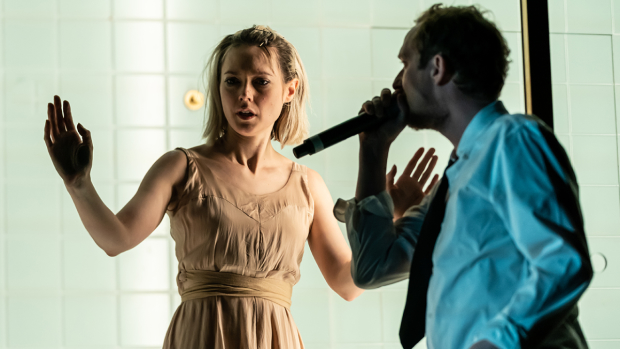Review: The Duchess of Malfi (Almeida Theatre)
Rebecca Frecknall directs a revival of John Webster’s classic

© Marc Brenner
The Almeida Theatre's associate director Rebecca Frecknall's last two shows at the venue, Summer and Smoke and Three Sisters, featured a lot of emptiness – a barren plain, an unfilled dais. This time around her take on John Webster's Jacobean tragedy The Duchess of Malfi is chock full of props, pieces and paraphernalia, with daggers, guns and pots of blood ominously sitting in expectation at the side of the stage in gilded cases.
It's exciting to see a director pushing away from their old form and Frecknall directs this nearly three-hour show at a rollicking pace – rattling through with a title card flashing up at the beginning of each scene – "A Birth", "A Trap", "A Banishment". Webster's tale, about two highborn Italian brothers that conspire to bring about the downfall of their widowed sister who has secretly married a man of low birth – is a juicy one, and is exhilaratingly thundered through with unrelenting ferocity.
Chloe Lamford's design is dominated by a single, glass-panelled box that houses Malfi for large portions of the play – at first a cabinet of curiosities for her brothers to ogle at, later a cage to trap her as they contemplate her death, and finally a cemetery for her blood-stained body to haunt. The box moves like waves slowly backwards and forwards throughout as Malfi's confinement looms over every scene, just as the mistreatment of women is placed front and centre in Frecknall's production (a lengthy essay questioning how far Malfi is a feminist play is a juicy programme read).
But for all its rightly fascinating bells and whistles it's hard to shake the feeling that the production never really does Webster's text justice – the man might not be Shakespeare but some moments, like Malfi's brother Ferdinand's bout of lycanthropic lunacy, are played as one-note screamfests.
Lydia Wilson tantalisingly plays the titular Duchess in a radically different way to the last major London revival of the show – which opened the Sam Wanamaker Playhouse back in 2014. It's a cooler, colder iteration of the character that has some engrossing moments – a monologue about salmon in a stream is riveting, while the way she inspects her own noose makes for a brilliant ten lines of theatre.
Leo Bill, returning for another festive season at the north London venue, also shines as Daniel de Bossola – a man hired by Ferdinand to spy on the Duchess before turning into her captor, killer and, later, avenger. In many ways Webster's answer to Iago, Bill revels in the moral ambiguity of the disillusioned manservant murderer – this production could quite easily be called The Duchess' Courtier. The toe-curlingly tense murder scene, as de Bossola quietly strangles the Duchess (Frecknall has de Bossola himself commit the crime, rather than his servants) is played almost as if the two were getting ready for bed – Bill in black and navy pyjamas, Wilson in a shimmering slip that she sports as she wanders through the afterlife.
But while some performances are so brilliantly fresh (Khalid Abdalla is note-perfect as the Duchess' secret husband Antonio) others feel too by-the-book and uninspired, and it makes the whole production uneven – a sheened straight-take mashed up with an abstract re-imagination. At times you feel as though Bill is playing in another show entirely.
A closing slow-motion sequence – as four dying men grovel in oily black blood while Purcell's "Dido and Aeneas" blares out – looks like a Baroque painting made manifest – lighting designer Jack Knowles mixes chiaroscuro and carnage. It's a rich conclusion to an uneven take on Webster's classic, a binge-able box set thriller that, though full of novelty, rarely has the necessary heart to make the hurt of the tragedy ring out.

















